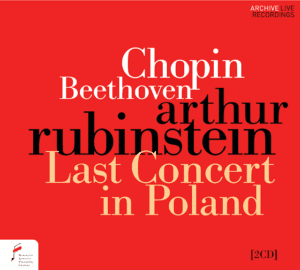On May 30, 1975 Arthur Rubinstein played his last concert in Poland, an occasion commemorating the Lodz Philharmonic Orchestra’s 60th anniversary that featured two works: Chopin’s Concerto No. 2 in F minor and Beethoven’s “Emperor” concerto. The program is released here for the first time.
That an 88-year-old pianist can summon the stamina to play two demanding concertos in one concert is impressive enough; yet it’s even more amazing that Rubinstein was still at close to the top of his form. Naturally there are tiny finger slips here and there, but they’re totally inconsequential in light of the veteran pianist’s gorgeous tone, full-bodied projection, naturally proportioned rubato, and communicative immediacy.
In fact, his Chopin concerto sings out more freely and poetically than in any of his four studio recordings of the work. The Lodz ensemble may be a little raw toned and occasionally out of alignment with the soloist, but conductor Henyrk Czyz clearly goes after firm rhythms and lean textures. Interestingly, Rubinstein permits the strings to play col legno in the third movement’s second theme, rather than the conventional bowing that he usually requested.
The Beethoven concerto’s outer movements are comparably robust when compared alongside the pianist’s studio versions with Daniel Barenboim from the same year, yet with more forward momentum in passages like the Rondo’s coda and the first movement’s downward scale interchanges between soloist and orchestra. Rubinstein doesn’t play softly enough in the Adagio, but that was usually the case.
For an encore, Rubinstein serves up his inevitable Chopin A-flat Polonaise. While the pianist pounds out the central octave Trio as he tended to do in concert (his three recorded versions are relatively contained) he compensates with the heartfelt nobility and eloquence of his lyrical playing elsewhere. In all, a strong and compelling souvenir of Rubinstein’s final years before the public.
































